Peace for the Next Generation
Jaime Horn ’98 trains female negotiators.
With wariness, then with more confidence, eight young women inched along a balance beam on a ropes course in the woods of Virginia. Some wore short pants and T-shirts sporting the names of colleges. Some wore long pants and headscarves.
The next week the group visited The Rachel Maddow Show set in New York City, joking with the MSNBC host that, unbeknown to cable news viewers, she wears jeans and sneakers with her blazer while on-camera.
A few days later, they sat around a table in Washington, D.C., and developed a policy briefing to present to the U.S. State Department.
The small group participated in the Andi Leadership Institute for Young Women. The three-year-old peace-building nonprofit is the brainchild of Jaime Horn ’98, who started the organization as a tribute to her late best friend and the organization’s namesake, Andi Parhamovich.
“We want there to be a global network of young women peace builders who are creating change in their own communities,” Horn said. It’s the kind of change Parhamovich would have wanted her to create.
In 2006, Horn was the vice president of communications at Air America, a Washington, D.C.-based radio network that dissolved in 2010. While Horn enjoyed her work, she and Parhamovich, who also worked at Air America, talked about taking on a project that would have a more concentrated focus within the international arena.
“It changed my life completely, forever.”
Jaime Horn ’98, on the death of her best friend
Bad News While in Iraq
Parhamovich made her move first. She relocated to Iraq to work with a democracy-building nongovernmental organization. Then one day in January 2007, Horn got the call that altered her life: Her best friend’s convoy had been ambushed as it returned from a democracy event in Baghdad. Parhamovich was dead. She was 28.
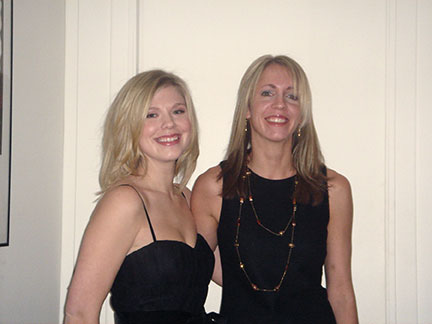
Jaime Horn ’98 (right) with her best friend Andi Parhamovich in 2005. (photo courtesy of Jaime Horn)
“It was one of those catalysts, like, ‘OK, what are you going to do now?’” Horn said. “It changed my life completely, forever.”
Reeling from her friend’s death, Horn embarked on her own global journey. She traveled to Ghana, volunteering with Women In Progress. Her experience with that nonprofit organization was humbling and healing. Then she earned a master’s degree in conflict transformation at the School for International Training, which is based in Vermont. She chose the field of study because of her communication background, but there was another factor.
“I had been rocked to the core over my best friend’s death because of war, and I was trying to understand that,” she said. “And to understand the Iraq war being so complicated because of America’s involvement, and conflict in general – in our own lives and relationships.”
For Horn’s graduate school capstone project, she worked with the United Nations Women South Asia Regional Office in New Delhi. She focused on efforts to combat human trafficking and violence against women. While in India, she learned more about women’s roles in peace and security, and she started to focus on an unfortunate irony: Women are highly effective peace builders, yet they are often left out of the peace negotiation process.
Studies have shown that more than half of all peace negotiations collapse within five years, often because the accords fail to address the underlying causes of the conflict. To build lasting peace, all stakeholders – men and women, ethnic and religious groups – need to participate together. But women are often viewed as “victims of war” rather than “agents of change”; thus, they are often excluded from the negotiation process.
“She’s passionate about not only what she’s teaching, but also the relationships she builds with each of us. She won our hearts from day one.”
Jamie Aron, who participated in the Andi Leadership Academy, on program founder Jaime Horn '98.
Horn said that because women are perceived as less threatening than men, they are better suited as mediators. Women often are community leaders and more aware of how people in those communities are affected by conflict. Grassroots work by women often is effective.
Leymah Gbowee of Liberia, one of three female 2011 Nobel Peace Prize recipients, organized Christian and Muslim women to pressure warring factions into successful negotiations. Mossarat Qadeem, a former political science professor in Pakistan, now meets with mothers and sons to talk the boys out of becoming suicide bombers.
But the United Nations reports that women represent fewer than 10 percent of participants in U.N.-sponsored peace talks, and a woman has never been a chief mediator. Horn wondered how she could change that.
What is the Role of Women?
When Horn returned from India, she went to work as a communication specialist at the Institute for Inclusive Security, a nonprofit organization founded by Swanee Hunt ’72, an expert on domestic policy and foreign affairs. The fellow TCU alum started the Washington, D.C.-based group to involve more women in the peace process.
In a twist of foreshadowing, Horn remembered Hunt speaking at a women’s symposium in Dallas during her TCU days. At the time, Hunt was the U.S. ambassador to Austria.
“I was so impressed with her as a voice for women,” Horn said. “She had such drive and determination and was so eloquent at the same time.”
Horn’s new job with Hunt’s organization included travel to South Sudan to study women’s involvement in the peace process. She always had been drawn to mentoring young women, and she began to wonder how she could prepare them to fill peace-building roles, so there would be no shortage – real or perceived – of qualified candidates in the future.
Horn and Kim Massey, a friend from her graduate school program, raised funds, developed a curriculum and held the first Andi Leadership Institute program in August 2013. The original eight participants were from Iraq, the U.S., Syria and Afghanistan.
The group of young women gathered in Washington, D.C., for three weeks of intense training. They attended workshops on conflict analysis, peace negotiation and leadership. Using Horn’s connections in communication, politics and advocacy, the participants wrote and presented a speech to Lissa Muscatine, a former speechwriter for Hillary Clinton, and they visited with Maddow, who is a member of the leadership institute’s advisory council.
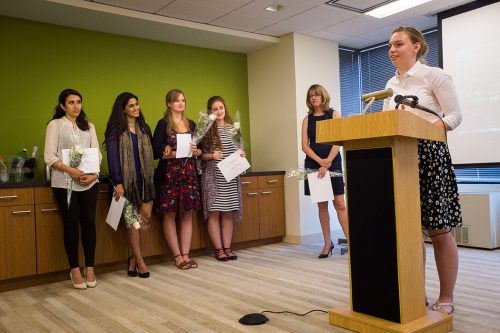
Caroline Cosby delivers a presentation during the summer closing ceremony for 2016 Andi Leadership Institute for Young Women. Waiting for their turn to speak are, from left, participants Farah Al-atrash, Nausheen Rajan, Mackenzie Wright, Farah Mechref and program director Jaime Horn ’98.
In summer 2016, the leadership institute brought together its third group of participants. As a final assignment, each woman must develop a capstone project that will create social change in her home community. The leadership institute gives participants a small grant, while Horn and Massey offer support via face-to-face chats online. Among the 2013 and 2014 capstone projects, Sarah, from India, surveyed the needs of residents in an area of Assam affected by ethnic violence. Minahil, from Pakistan, taught volunteers team-building skills through Rabtt, an education-focused organization.
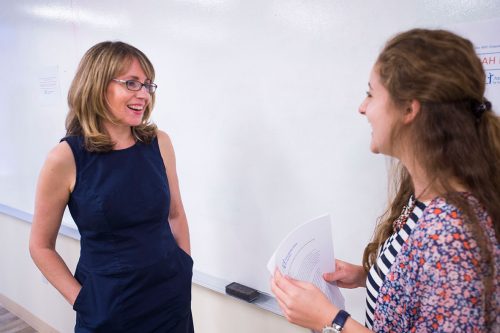
Jaime Horn ’98, left, talks with summer leadership participant Farah Mechref.
Massey worked in youth peace-building programs before co-launching the leadership institute. The young participants were, she said, a revelation in women’s innate wisdom and drive to persevere. “Through working with Jaime and the young women from diverse backgrounds – many of them in very challenging situations where they’re not valued because of their gender, or they’re surrounded by violence – I feel like I really have an understanding of the resiliency of the human spirit.”
For many international participants, the leadership training meant their first visit to America. They had American roommates during the program, forming relationships that are becoming the institute’s most lasting legacy. For example, Jamie Aron, who graduated from college in 2016, participated in the program the summer before her junior year. Aron’s roommate, Minahil Shahid of Lahore – who worked with Rabtt for her capstone project – made the biggest impression.
“(Shahid) and I were able to connect on so many different levels,” said Aron, who studied political science and math at Mississippi State University. “We were able to discuss things like politics and religion and society, anything from what it’s like to live at a university, to what our family dynamics are, to what it means to be yourself and be proud of your heritage.”
Aron also learned how to collaborate on projects with women from different backgrounds – as well as the reasons women should be involved in the peace process.
“Women are often the recipients of the effects of conflict,” Aron said. “They and children are the ones in the refugee camps, and they are subject to rape used as a tool of war, yet they’re not put at the peace negotiation table or brought to address their perpetrators.
“To me it’s important to make sure they’re there to make sure justice is done,” she said. “Often men say, ‘Oh, we’ll deal with gender later, once we have a government and peace,’ but gender is part of building peace.”
Aron, who plans to become a physician, won a Truman Scholarship, which provides graduate school tuition and leadership training to about 60 future change agents from across the country. Horn, Aron said, is her personal role model and “a firecracker of a woman.”
“Just the sheer willpower to create an international program like ALI should show you how strong and dedicated she is,” Aron said. “She’s passionate about not only what she’s teaching, but also the relationships she builds with each of us. She won our hearts from day one.”
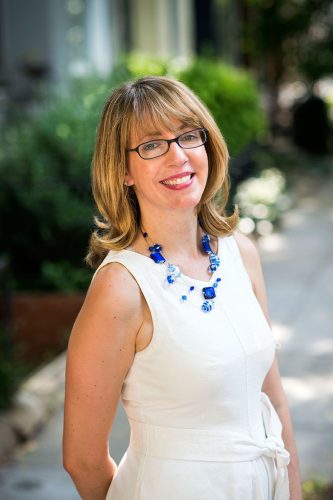
Jaime Horn
Horn said her own mentor, Jean Giles-Sims, emeritus professor of sociology, encouraged her to pursue an internship in Washington, D.C., during her final semester at TCU. An English major and women’s studies minor, Horn worked on a public awareness campaign dedicated to electing the first female U.S. president as part of her internship assignment.
Today, Horn continues to work in the communication and public affairs field. However, the planning, networking and fundraising for the leadership institute is often the equivalent of a second full-time job. She wants the organization to offer three leadership programs a year instead of the current one. She also wants to offer one program outside the U.S., perhaps in Turkey or Pakistan. Her dream is to see, a decade or two from now, today’s 20-year-old participants come back to lead their own group of young women.
Horn said it still moves her to hear people, including program participants, shorten the leadership institute’s name to Andi, as though referring to her late friend. “Her name is being talked about, and these young women are getting to learn about her,” she said. “I feel like she’s still very much alive and making a difference.”
Watch a TED Talk featuring Jaime Horn.

Your comments are welcome
Comments
Related reading:
Features
Politics 101
Students appraise the political landscape
Alumni
Exhibiting Talent
Andrea Karnes ’01 MA found her calling ― and the rest is art history.